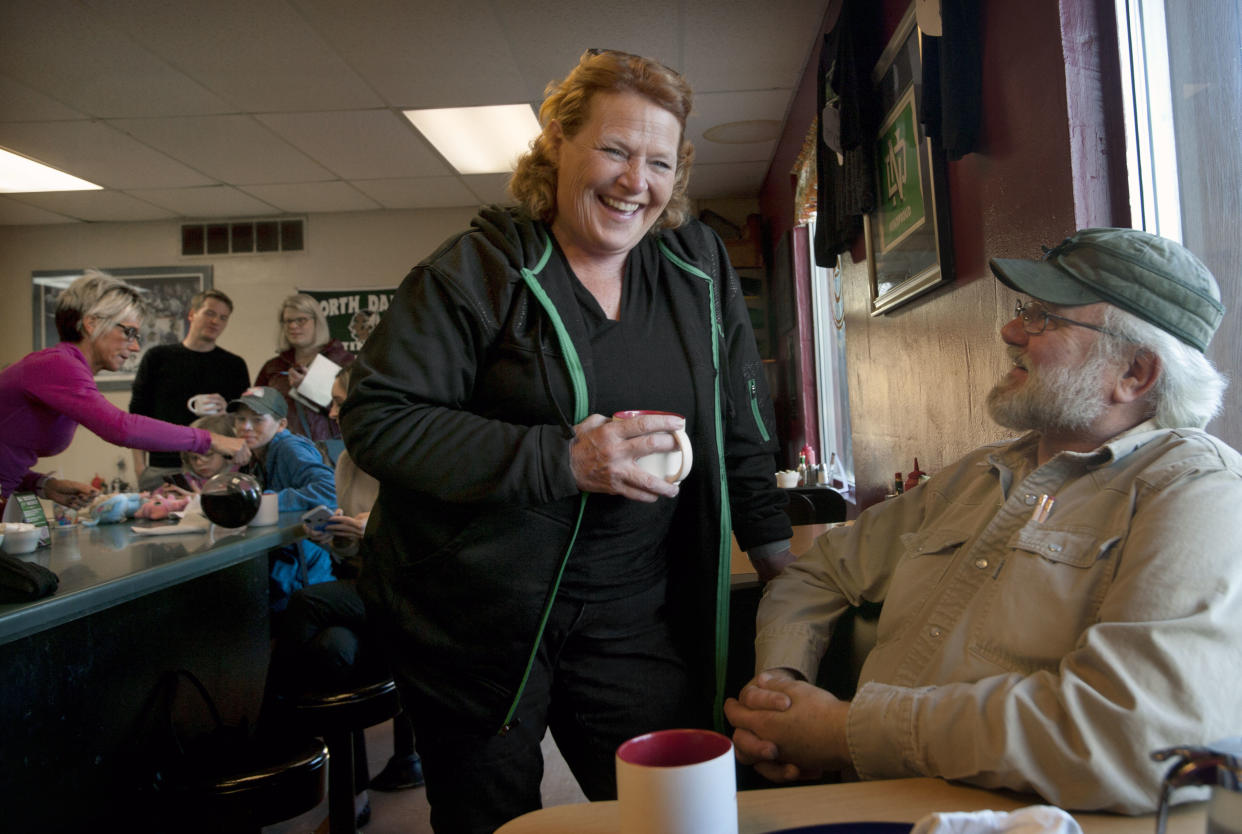Heitkamp sails against the wind in North Dakota

In many ways, the odds have always seemed stacked against Sen. Heidi Heitkamp of North Dakota.
Seeking reelection as a Democrat in a firmly red state where President Trump won by 36 points two years ago, Heitkamp has sought to rise above the nation’s hardened political partisanship, campaigning as a “true common-sense independent,” as she put it last summer, and urging North Dakotans to vote for a lawmaker who will put their needs above party.
“One side is not always right,” Heitkamp has argued. “The left doesn’t always have it right. The right doesn’t always have it right.”
But a week out from Election Day, the rare polls in North Dakota’s hard-fought Senate race suggest that Heitkamp is trailing her Republican opponent, Rep. Kevin Cramer, by a significant margin — 16 points in one poll, 12 points in another. Her numbers dropped after her vote against Brett Kavanaugh’s confirmation to the Supreme Court — a vote Cramer, who has campaigned heavily on his loyalty to Trump, has seized on to argue that she does not vote the values of conservative North Dakotans. In recent days, national Democrats have privately said they believe the seat is all but lost — dealing a possibly fatal blow the party’s dream of recapturing control of the Senate.
But in a race that is also likely to shed light on whether moderate lawmakers can survive in this era of extreme polarization, Heitkamp is banking on conventional wisdom about the race being wrong. After all, as she has pointed out in recent weeks, the pundits wrote her campaign off for dead in her 2012 race amid polls that showed her trailing by at least 10 points in the final stretch, only to see her win by the narrowest of margins — 2,936 votes, to be exact.

Six years later, Heitkamp is aiming for another political miracle and doubling down on the strategy that has made her a fixture of North Dakota politics for more than three decades, dating back to her days as state tax commissioner in the 1980s and later as state attorney general.
She has flooded television airwaves with ads featuring herself and members of her family, spots that remind voters of her long service and work on behalf of her constituents, including farmers who have been hit hard by Trump’s trade war with China. And she has hit the ground running with a schedule heavy on retail politics. She has spent long hours in recent days knocking on doors and holding potluck dinners — Hot Dish with Heidi, she calls them — in an attempt to connect with as many North Dakotans as possible across the heavily rural state.
“People here know me. Even if they don’t agree with me all the time, they know I fight for them,” she has argued. “I wake up every morning thinking about rural America. I’m not sure how many other people can say that and really mean it.”
The strategy is driven by Heitkamp’s gut feeling that North Dakota voters are more independent than people think and can be persuaded by a candidate’s personal touch. “If they weren’t, I wouldn’t be here,” she said. If the polls are to be believed — and many say polling in the state is tricky and often unreliable — 17 percent of likely Cramer voters in a survey conducted for the NBC affiliate in Fargo said they were open to changing their minds in the final stretch of the campaign. That’s a number large enough to swing the election in theory.
But it’s uncertain that Heitkamp can actually change voters’ minds with just a week to go. Unquestionably, she has the money to compete. During the first 17 days of October, the senator raised more than $12.5 million — mostly small-dollar checks that came in from around the country after she voted to oppose Kavanaugh. As of Oct. 17, she had more than $11 million cash on hand, while Kramer reported just $976,046.

The campaign has not said how it will spend the money, though a good portion is likely to go into the senator’s ground game, including a statewide tour this week in which she will campaign with former Vice President Joe Biden. Heitkamp already had more than $1 million in ad time reserved for the final week of the campaign and could add to that if she chose.
Not unlike her fellow red-state Democrat, Sen. Claire McCaskill of Missouri, who is also in a tough reelection campaign, Heitkamp has hammered Cramer on health care and trade. She has called out his support for rolling back the Affordable Care Act, including provisions that would block insurance companies from dropping patients with preexisting conditions, a big issue for the poor and aging population in the state. Cramer has disputed her claims — arguing that he supports preexisting condition protections, but he has not offered a specific policy on how he would do that.
In a state where the president is resoundingly popular, Trump has loomed over the race. Heitkamp has pitched herself as both a partner to Trump — pointing out that their work together on policy helped ease regulations on community banks and on energy — and as a polite critic, more so lately, attacking his handling of Chinese tariffs. She has trashed Cramer for his “blind loyalty” to Trump and suggested he would be a “rubber stamp” for the president’s policies, even if they were hurtful to North Dakotans — a message she has pushed more aggressively in recent days.
“He’s all in on the president, and I’m all in on North Dakota,” she said.

In their final debate last Friday, the two clashed over trade — with Cramer praising the president for trying to undo bad trade policies that have hurt American farmers for decades. He acknowledged the negative impact on state soybean farmers, who primarily sell to China and who have been unable to sell this season’s crop, but argued that a season of pain is worth long-term gains. “You cannot turn around 30 years of bad trade policy in one month, in one season,” he argued.
But Heitkamp pushed back, calling Cramer “the kind of person whose blind loyalty to a president and an administration will sell our farmers down the road.”
“If you can’t, as a United States senator, stand at a podium and protect and defend the people of this state against bad administration policies, then you don’t belong in that job,” she said.
Cramer accused her of standing with China — or, as he put it, “Communist China.”
In a race where there is little margin for error, Heitkamp has been hurt by her own campaign’s missteps. Earlier this month, she fired a staffer after a campaign ad aimed at calling attention to Cramer’s comments to the New York Times criticizing #MeToo as a “movement toward victimization” revealed the identity of some sexual abuse survivors without their permission.
Heitkamp apologized repeatedly, calling it a “grave and horrible error.” “I not only disappointed many in North Dakota, I disappointed myself,” the senator said at the beginning of her Oct. 18 debate with Cramer.
After the debacle, Heitkamp looked for help from members of her family, who have made frequent appearances in her campaign spots over the years, testifying to the senator’s roots and character. The day after the debate, the campaign unveiled an ad featuring Heitkamp’s sister, Melanie, speaking publicly for the first time about how her older sister had helped her through an unplanned pregnancy, encouraging her to put the baby up for adoption.
“I was 19 and I was pregnant. I wasn’t married and my family was very poor. I had to make a choice. My sister helped me choose life,” Melanie Heitkamp says in the ad, adding that her sister “took her in and cared” for her and “cried” with her when she gave up the baby for adoption. “I know she loves North Dakota as much as she loved my baby girl.”
The spot was aimed at wooing back conservative voters angered at Heitkamp’s vote on Kavanaugh. At the same time, she has made the case one-on-one that her vote proves her independence and that she cast a vote based on what she thought was “right,” even if it could cost her another term in the Senate.
“The political rhetoric is, ‘You can’t vote that way if you expect to come back,’” she told voters earlier this month. “And I tell people, Ray and Doreen Heitkamp didn’t raise me to vote a certain way so that I could win. They raised me to vote the right way.”
_____
Read more Yahoo News midterms coverage:
In deep-red Missouri, McCaskill pursues voters far off the Democratic beaten path
Menendez race pits ethical concerns against party loyalty, and loyalty is winning
Portrait of a moderate district: NJ-11 leans R, but the race leans D
Virginia Republican congressman tries to weather scandal and wave of spending




